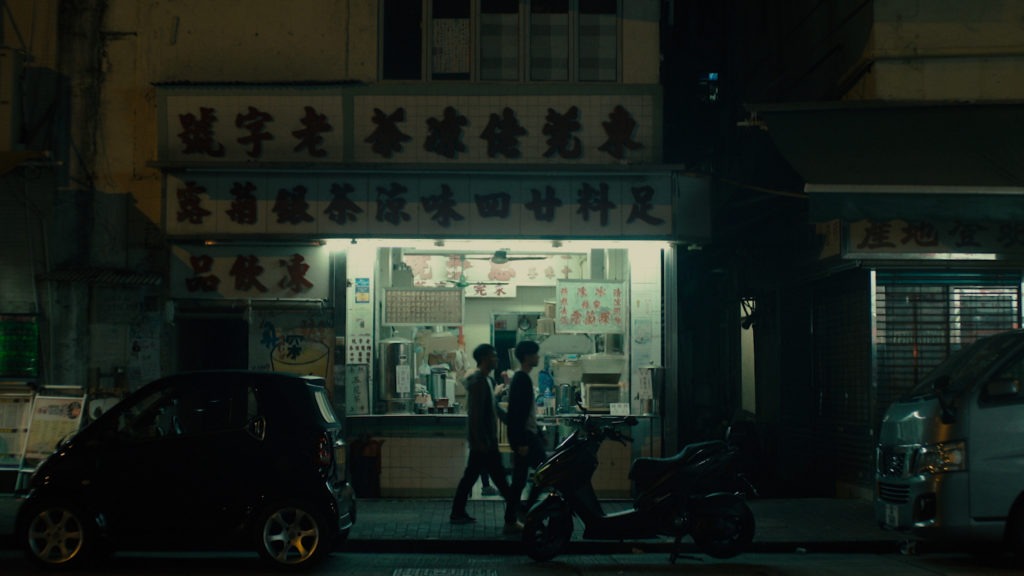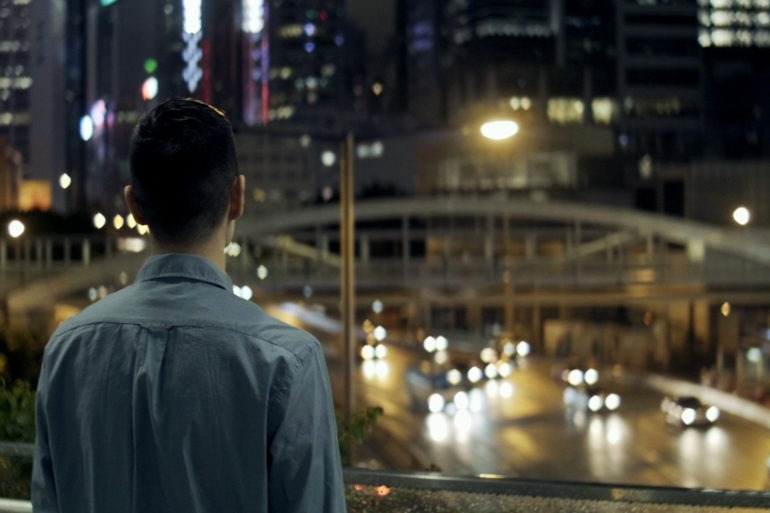Memories to Choke on, Drinks to Wash them Down 夜香・鴛鴦・深水埗 will return to Hong Kong theaters on February 18. Ticketing information here.
All film stills courtesy of Golden Stone Workshop Limited and Golden Scene Limited.
This review contains spoilers.

Change and memory are at the center of Kate Reilly and Leung Ming-kai’s Memories to Choke on, Drinks to Wash Them Down 夜香・鴛鴦・深水埗, an anthology film made up of four shorts that examine life amidst Hong Kong’s multiple, contemporary crises. In a remarkable scene from “Yuen Yeung,” the third short, John (Gregory Wong) and Ruth (Kate Reilly) continue their foodie tourism in Admiralty at what he calls the “most romantic KFC” in the city. Perplexed, Ruth asks why, to which he responds, “Look around you, look outside.” They walk out to the neighboring overpass and Ruth, from the perspective of an expat English teacher, thinks John is referring to the rather mundane sight of cars rushing down Harcourt Road in a nighttime Central cityscape. She responds, “You’re right, this KFC is romantic.” Realizing she doesn’t understand what he meant, he smiles ruefully.
It is only at the end of the short, as a voiceover narrates the colonial labor history of yuen yeung that we see an unexpected overlay of thousands of Hongkongers on Harcourt Road during the Umbrella Movement and understand what John really meant. The scene transitions into a shot of young students linking hands during the 2019 protests, making clear that his “romance” is the ongoing, history-spanning collective love for Hong Kong that forms as ordinary people come together to fight against repression. This is an unexpected but breathtaking gut-punch, after the short has spent most of its runtime lulling the viewer into believing it is a modern spin on the melancholy, individualistic passion of In the Mood for Love or the dialogue-driven romance of Before Sunrise (though it should be noted that “Yuen Yeung,” thanks to Wong and Reilly’s incredible chemistry, is also all of these things, and expertly, deliciously so).
As Hong Kong’s crises deepened around the time that directors and screenwriters Kate Reilly and Leung Ming-kai completed the film, it is to their credit that they avoid the temptation of a straightforward David and Goliath tale. Instead, they turn to the sardonic core of Hong Kong’s culture of survival: While John makes a serious point about the romance of political resistance and collective love, the sight of students protesting CCP repression is set to the tune of a rousing PLA-version of “The Internationale.” By mixing the serious and the absurd, Reilly and Leung’s confident screenplay puts the bewildering ordinariness of Hong Kong life, its inexplicable ongoingness in the face of collective trauma, center stage.

At the center of all of these stories is the local, especially as it manifests for marginalized or minoritarian Hong Kong subjects: migrant domestic workers, the increasingly dispossessed working class, and even expat visitors. But the local in these renditions avoids Hong Kong cultural production’s penchant for melodrama. For example, the ever-present tension of encroachment from the mainland, whether its government or Chinese nationalists, is certainly a brute reality in Hong Kong, but one that the filmmakers never treat as an inevitable plot element or inescapable character motivation. In other words, the cultural and ethnic animosity against the mainland is not an eventuality, an essential characteristic of “Hongkongers,” nor a necessity for future struggle against repression.
The first short, “Forbidden City,” illustrates this sense of localism well: a cleverly plotted circular narrative featuring the wonderfully understated performances of Mia Mungil, playing an Indonesian migrant domestic worker, and Leung Cheok-mei, who plays an elderly woman who emigrated from the mainland in the 1950s. While the extreme exploitation of migrant domestic workers is the material reality of Hong Kong’s neoliberal labor regime, such a reality often becomes overwrought in other films that deal with the migrant domestic worker experience. As important as it is to communicate the struggles of migrant workers in Hong Kong, the overuse of the filmic shorthand of the suffering ethnic minority threatens to cement rather than subvert this representation and its material foundation.
To that end, “Forbidden City” features almost no oppressive elements, instead offering a different entry point to consider the invisibilized but critical care work and emotional labor that domestic workers perform. Absent an overt focus on exploitation, Reilly and Leung draw out further the contingent nature of the local: The domestic worker mentions numerous times that she has been in Hong Kong for a decade, which is why she can speak Cantonese. The employer mentions that she came to Hong Kong as a refugee by boat when she was 10, presumably around the close of the Chinese Civil War. This is a unique approach to the contentious and multifaceted philosophy of Hong Kong localism: It must be relational if it is to be a sense of localism that serves all Hongkongers, and it must be a sense of the local built on the contingency of social exchange, not on one’s essential ethnicity, lineage, or social standing. This latter point is exaggerated to the point of literal invisibility—the employer has short term memory loss and frequently forgets who the domestic worker even is—yet they share a sense of the local nonetheless.
Reilly and Leung are careful, however, to avoid crafting an overly rosy picture of employer-employee relations: The segment closes with the employer asking the domestic worker if she has any children, and she responds that she has a son. In that moment, we see two mothers bonding, but across a highly uneven divide. After all, one of them is not with her son, socio-economic forces dictating that she perform care work for her employer rather than for him.
“Toy Stories” is a quiet, unassuming study of a family-owned toy shop in Sham Shui Po, building subtly upon the themes of the local through nostalgia. Two brothers, played by Zeno Koo and Lam Yiu-sing, discuss childhood memories through the various by-now retro toys crammed in their mother’s shop, which she has been hoping to sell as the neighborhood changes around them. The two brothers come to terms with the disastrously common local experience of socio-economic stuckness amidst the detritus of their childhood. There is no neat finale to this story; in fact, most of the narrative threads remain dangling, as a gesture to the uncertainty that remains ahead for Hong Kong’s working class. Rather, it ends on another downbeat reality: The younger brother, after being fired from his office job, is now driving a Gogo van as part of the so-called “gig economy,” which exacerbates the precarity of an increasing number of Hongkongers that have been shut out from the city’s receding middle-class promise.

The final segment is the exceptional “It’s Not Gonna Be Fun,” a documentary short that follows Jessica Lam Sin-tung, the Second Sister of Sham Shui Po and possibly the most reluctant politician in Hong Kong history, and her bid to oust the long-time, uncontested pro-Beijing incumbent Lau Pui Yuk in the 2019 District Council elections. Interspersed with real-life footage of the ongoing street protests, the film’s coverage of Jessica’s campaign offers a more subdued but no less rebellious assertion of Hong Kong political will founded in the same groundswell of local grassroots political organizing that reached across all sectors of society.
In less adept hands, this short could have waded into the waters of overt anti-mainland Chinese xenophobia, which some may feel is warranted against Beijing political machine-backed politicians that dominate the field with their plentiful funding and dirty electioneering tactics. Instead of arguing for an essential difference between Hongkongers and mainland Chinese, however, Reilly and Leung trust the audience to see the political difference by counterposing Jessica’s misanthropy and sarcastic nihilism (underwritten by a fiery political belief in Hong Kong resistance) against the politicking, like trotting out DAB heavyweight Jasper Tsang, and astroturfing, like bussing in paid supporters of all pro-Beijing political campaigns in Hong Kong. Such contemptible, anti-democratic political practice, the film seems to suggest, speaks for itself. Jessica’s darkly humorous perseverance in the face of overwhelming odds is not only understandable, but is a core part of Hong Kong’s culture of survival.
Even as we know how it all turned out, the film’s deep sense of the local through the eyes of Jessica, intertwined with the street protests and surge in grassroots political participation, seems to promise that change is coming. Viewers either accustomed to documentary convention that spotlights rousing victories, or in the absence of that, dramatic, tear-soaked reactions to loss, were upset at Jessica’s shoulder-shrugging acceptance, as Reilly has noted. Given the stakes and impact of real life events, it’s understandable that some would yearn for an analogous cinematic response to the defeats suffered by resistors on the streets. But catharsis can happen in multiple registers: Jessica’s challenge to those who have gone unchallenged for decades sheds further light on the senselessness of the system that the British colonial regime created and the CCP cynically upholds. Her admission that the system is rigged against regular Hongkongers and her willingness to fight nonetheless offer a melancholy, kindred response to the ongoing, uneven fight against authoritarian repression.

Still, the pessimism is underwritten by a sense of sincerity, on the part of the filmmakers and Jessica and her campaign. As a soaring Teenage Riot track kicks in, Reilly and Leung capture the final moments of election day, and the earnest passion with which Jessica and her grassroots team fight to the end. Her care for Sham Shui Po combined with an apparent skill at campaigning (despite her self-deprecating protestations) is what makes her jumping through the hoops of the District Council elections a powerful, heartbreaking political act; in another life, under a fairer system, one could imagine her to be the long-time incumbent politician.
This latter half of the anthology approaches politics through a sober realism, which stands in stark contrast to the over-the-top drama of the widely-acclaimed Ten Years, another film anthology of shorts that critics have often referenced in reviews of Memories. Indeed, there are many similarities: their treatments of memory and change, the fact that they were both originally written in the aftermath of the Umbrella Movement, and take a wide view of Hong Kong’s complex historical and contemporary dilemmas. Yet Memories eschews the obvious in approaching these familiar anxieties, letting the multiple crises that have only deepened since 2014 impinge on the film’s characters from the margins. This reflects in more subdued ways in which Hongkongers have tried to carry on in the midst of crisis, and reminds us of the stakes of the central narratives, making them at once weighty and light.
For all of the commentary that Ten Years “predicted” the calamities of 2019 and 2020 through its magnifications and extrapolations of existing fears, it often undercut its own claim to prescience with indulgent exaggerations that only served to deepen the dynamics that entrap the city. Self-immolation in front of the British consulate, and the scaremongering xenophobia of “economic anxiety,” for example, cement essential difference through methods of classical political allegory—stock avatars symbolizing specific traits. Reilly and Leung, however, rely on narrative development through relationality and characters that feel lived-in, instead of the high drama of protest conflict (as numerous documentary features in 2020 have done already).
Memories to Choke On, Drinks to Wash Them Down thus offers up under Reilly and Leung’s skilled hands a wry vision of Hong Kong’s traumatic absurdities, a rigged system that is at once laughable and full of grief. Written originally in the wake of the Umbrella Movement as a generational, domestic drama in the vein of Edward Yang’s Yi Yi, the screenplay continued to morph in the years since until it ran headlong into the events of 2019. The film’s narrative conveys ongoingness, a suspension in nauseating uncertainty of what fresh catastrophe will occur day by day.
There is almost no “climax” to Memories, but then again we are not often afforded that luxury in our real lives either. Indeed, the year-long protests did not end in conclusive, cathartic denouement but only ever-deepening repression. Memories is a film borne of that reality, an ironic, pensive meditation on life in the middle of disaster.
Kate Reilly is an actor and filmmaker from the United States. As an actor, Kate has worked with directors including Anocha Suwichakornpong, John Magary, Lee Chatametikool, and Leung Ming- kai, in films that were selected by Rotterdam’s Tiger Awards, Busan, Tribeca, Tokyo, and Edinburgh Film Festivals, as well as HBO’s US Comedy Arts Festival. Kate was on a house sketch team that wrote and performed live comedy at the Peoples Improv Theater in New York.
Leung Ming-kai is a cinematographer and filmmaker from Hong Kong. Kai has shot more than a dozen celebrated features including Sylvia Chang’s Murmur of the Hearts, Johnny Ma’s Old Stone, and Anocha Suwichakornpong’s By the Time It Gets Dark. His most recent cinematography effort, Ray Yeung’s Suk Suk, screened at Berlin and was nominated for Best Picture at the Hong Kong Film Awards. Kai has also directed several short films. Three Boys represented the Philippines in competition at Clermont-Ferrand Short Film Festival and won the top prize at the Hong Kong Independent Film & Video Awards.



